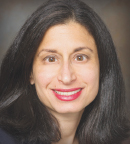Discussant of these abstracts on the Oncology Care Model (OCM), Kerin B. Adelson, MD, MHCDS, Chief Quality and Value Officer at The University of Texas, MD Anderson Cancer Center, suggested the OCM was beneficial for both patients and health professionals despite the lack of clear positive results.
“The program design was flexible, and it allowed us to be creative,” said Dr. Adelson, drawing from her personal experience at Yale University. “The OCM allowed the formation of new clinical programs, including care coordination, improving urgent care services and designing clinical pathways.”

Kerin B. Adelson, MD, MHCDS
Dr. Adelson also noted patients in OCM were more likely to be asked about social-emotional distress or concerns in offered resources; to discuss advanced directives with their providers; and to be satisfied with their providers’ explanation of treatment benefits, risks, adverse effects, and cost.
Nevertheless, Dr. Adelson acknowledged the OCM did not lead to objective improvements compared with non-OCM practices. She suggested future models of care might need to be more prescriptive about their required infrastructure.
“Mandatory models might reduce the selection bias toward practices that hope to achieve economic dividends, and multipayer strategies might help activate and unify practices around value,” Dr. Adelson concluded. “Future analysis should focus on the highest-performing practices and whether they built systems that can be scaled.”
DISCLOSURE: Dr. Adelson reported financial relationships with Emilio Health/Brightline Health, Carrum Health, Genentech, AbbVie, and Quantum Health.

